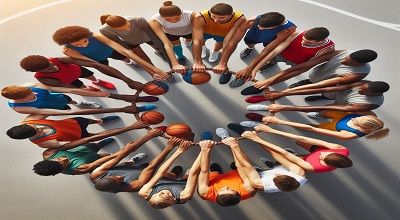Unity important in sports
Unity is a crucial element in sports, fostering camaraderie, enhancing performance, and promoting a positive team culture. It involves a shared sense of purpose, mutual respect, and cooperation among team members, coaches, and support staff. When unity prevails, teams can overcome challenges, achieve their goals, and create a harmonious environment that encourages individual growth and success.
Unity in sports manifests in various ways. Teammates support and encourage each other, celebrating individual achievements while recognizing the collective effort behind every victory. They trust and rely on one another, fostering effective communication and coordination on the field or court. A unified team exhibits resilience in the face of adversity, bouncing back from setbacks and maintaining a positive mindset.
Moreover, unity extends beyond the playing field. Teams that prioritize unity often engage in team-building activities, fostering strong bonds and a sense of belonging. This can involve social events, community service, or simply spending quality time together outside of practice and competition. By nurturing unity, teams create a supportive environment where individuals feel valued, motivated, and inspired to perform at their best.
How do sports unite us?
Sports unite us in various ways, transcending cultural, geographical, and social barriers to create a sense of shared purpose, community, and camaraderie. Here are some ways in which sports bring people together:
1. Shared Passion: Sports provide a common interest that brings people together, regardless of their background or beliefs. Whether it’s cheering for a favorite team or participating in a friendly game, the love of sports creates a bond that unites individuals from diverse walks of life.
2. Cultural Exchange: International sporting events such as the Olympics and the FIFA World Cup serve as platforms for cultural exchange and global unity. Athletes and fans from different countries come together to celebrate athleticism, sportsmanship, and the spirit of competition, fostering mutual respect and understanding.
3. Community Building: Local sports teams and events play a vital role in building community spirit. They provide opportunities for people to come together, support each other, and form lasting connections. Whether it’s a neighborhood soccer match or a city-wide marathon, sports events encourage community engagement and solidarity.
4. Teamwork and Collaboration: Participation in team sports teaches valuable lessons about teamwork, collaboration, and mutual support. Athletes learn to work together towards a common goal, relying on each other’s strengths and supporting one another through challenges. These experiences translate into broader principles of cooperation and unity in other aspects of life.
5. Bridging Divides: Sports have the power to bridge social divides and promote inclusivity. They offer a platform where people from different backgrounds can interact, compete, and build relationships based on mutual respect and shared goals. This can contribute to breaking down stereotypes and fostering empathy.
6. Inspiration and Pride: Sporting achievements can inspire pride and unity within communities and nations. When athletes represent their country on the world stage, their performances can instill a sense of national pride and bring people together in support of a common cause.
Summary
In summary, unity in sports is about coming together as a cohesive unit, working towards a common goal, and embracing the power of teamwork. It’s a fundamental principle that contributes to success, enjoyment, and personal growth in the world of sports.
Sports unite us by fostering connections, promoting understanding, and celebrating the human spirit. They provide a platform for shared experiences, mutual respect, and the celebration of diversity, contributing to a more interconnected and harmonious world.
